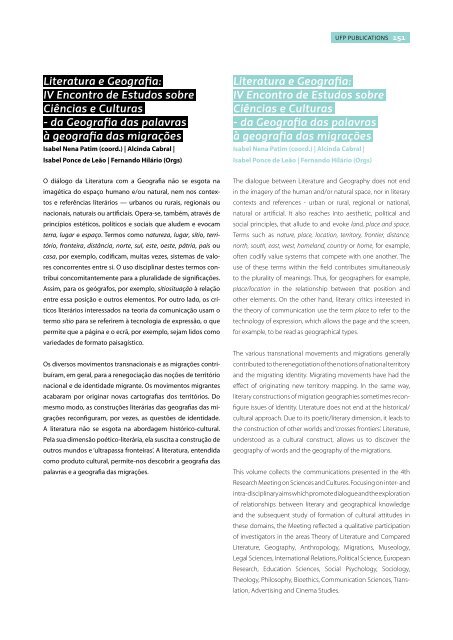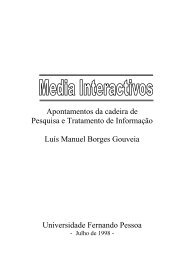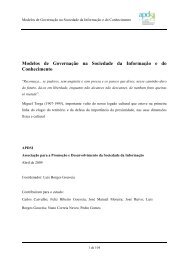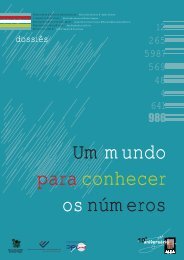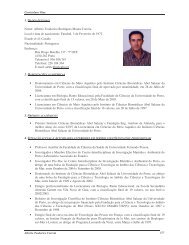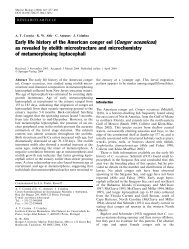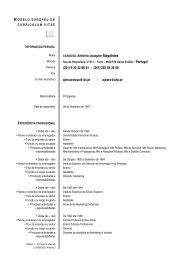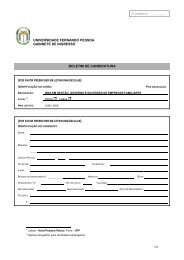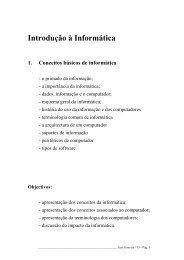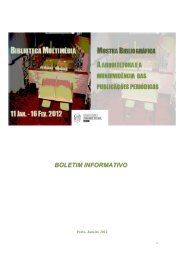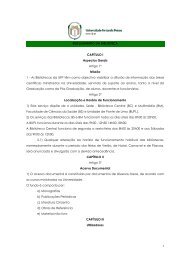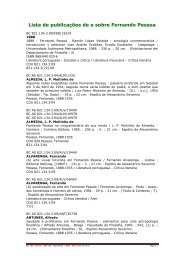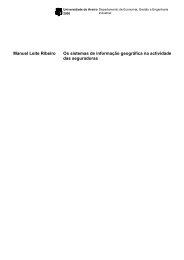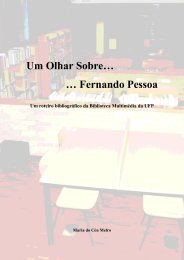UFP and the - Universidade Fernando Pessoa
UFP and the - Universidade Fernando Pessoa
UFP and the - Universidade Fernando Pessoa
Create successful ePaper yourself
Turn your PDF publications into a flip-book with our unique Google optimized e-Paper software.
Literatura e Geografia:<br />
IV Encontro de Estudos sobre<br />
Ciências e Culturas<br />
- da Geografia das palavras<br />
à geografia das migrações<br />
Isabel Nena Patim (coord.) | Alcinda Cabral |<br />
Isabel Ponce de Leão | Fern<strong>and</strong>o Hilário (Orgs)<br />
O diálogo da Literatura com a Geografia não se esgota na<br />
imagética do espaço humano e/ou natural, nem nos contextos<br />
e referências literários — urbanos ou rurais, regionais ou<br />
nacionais, naturais ou artificiais. Opera-se, também, através de<br />
princípios estéticos, políticos e sociais que aludem e evocam<br />
terra, lugar e espaço. Termos como natureza, lugar, sítio, território,<br />
fronteira, distância, norte, sul, este, oeste, pátria, país ou<br />
casa, por exemplo, codificam, muitas vezes, sistemas de valores<br />
concorrentes entre si. O uso disciplinar destes termos contribui<br />
concomitantemente para a pluralidade de significações.<br />
Assim, para os geógrafos, por exemplo, sítiosituação à relação<br />
entre essa posição e outros elementos. Por outro lado, os críticos<br />
literários interessados na teoria da comunicação usam o<br />
termo sítio para se referirem à tecnologia de expressão, o que<br />
permite que a página e o ecrã, por exemplo, sejam lidos como<br />
variedades de formato paisagístico.<br />
Os diversos movimentos transnacionais e as migrações contribuíram,<br />
em geral, para a renegociação das noções de território<br />
nacional e de identidade migrante. Os movimentos migrantes<br />
acabaram por originar novas cartografias dos territórios. Do<br />
mesmo modo, as construções literárias das geografias das migrações<br />
reconfiguram, por vezes, as questões de identidade.<br />
A literatura não se esgota na abordagem histórico-cultural.<br />
Pela sua dimensão poético-literária, ela suscita a construção de<br />
outros mundos e ‘ultrapassa fronteiras’. A literatura, entendida<br />
como produto cultural, permite-nos descobrir a geografia das<br />
palavras e a geografia das migrações.<br />
<strong>UFP</strong> PUblICATIOnS 151<br />
Literatura e Geografia:<br />
IV Encontro de Estudos sobre<br />
Ciências e Culturas<br />
- da Geografia das palavras<br />
à geografia das migrações<br />
Isabel Nena Patim (coord.) | Alcinda Cabral |<br />
Isabel Ponce de Leão | Fern<strong>and</strong>o Hilário (Orgs)<br />
The dialogue between Literature <strong>and</strong> Geography does not end<br />
in <strong>the</strong> imagery of <strong>the</strong> human <strong>and</strong>/or natural space, nor in literary<br />
contexts <strong>and</strong> references - urban or rural, regional or national,<br />
natural or artificial. It also reaches into aes<strong>the</strong>tic, political <strong>and</strong><br />
social principles, that allude to <strong>and</strong> evoke l<strong>and</strong>, place <strong>and</strong> space.<br />
Terms such as nature, place, location, territory, frontier, distance,<br />
north, south, east, west, homel<strong>and</strong>, country or home, for example,<br />
often codify value systems that compete with one ano<strong>the</strong>r. The<br />
use of <strong>the</strong>se terms within <strong>the</strong> field contributes simultaneously<br />
to <strong>the</strong> plurality of meanings. Thus, for geographers for example,<br />
place/location in <strong>the</strong> relationship between that position <strong>and</strong><br />
o<strong>the</strong>r elements. On <strong>the</strong> o<strong>the</strong>r h<strong>and</strong>, literary critics interested in<br />
<strong>the</strong> <strong>the</strong>ory of communication use <strong>the</strong> term place to refer to <strong>the</strong><br />
technology of expression, which allows <strong>the</strong> page <strong>and</strong> <strong>the</strong> screen,<br />
for example, to be read as geographical types.<br />
The various transnational movements <strong>and</strong> migrations generally<br />
contributed to <strong>the</strong> renegotiation of <strong>the</strong> notions of national territory<br />
<strong>and</strong> <strong>the</strong> migrating identity. Migrating movements have had <strong>the</strong><br />
effect of originating new territory mapping. In <strong>the</strong> same way,<br />
literary constructions of migration geographies sometimes reconfigure<br />
issues of identity. Literature does not end at <strong>the</strong> historical/<br />
cultural approach. Due to its poetic/literary dimension, it leads to<br />
<strong>the</strong> construction of o<strong>the</strong>r worlds <strong>and</strong> ‘crosses frontiers’. Literature,<br />
understood as a cultural construct, allows us to discover <strong>the</strong><br />
geography of words <strong>and</strong> <strong>the</strong> geography of <strong>the</strong> migrations.<br />
This volume collects <strong>the</strong> communications presented in <strong>the</strong> 4th<br />
Research Meeting on Sciences <strong>and</strong> Cultures. Focusing on inter- <strong>and</strong><br />
intra-disciplinary aims which promote dialogue <strong>and</strong> <strong>the</strong> exploration<br />
of relationships between literary <strong>and</strong> geographical knowledge<br />
<strong>and</strong> <strong>the</strong> subsequent study of formation of cultural attitudes in<br />
<strong>the</strong>se domains, <strong>the</strong> Meeting reflected a qualitative participation<br />
of investigators in <strong>the</strong> areas Theory of Literature <strong>and</strong> Compared<br />
Literature, Geography, Anthropology, Migrations, Museology,<br />
Legal Sciences, International Relations, Political Science, European<br />
Research, Education Sciences, Social Psychology, Sociology,<br />
Theology, Philosophy, Bioethics, Communication Sciences, Translation,<br />
Advertising <strong>and</strong> Cinema Studies.


